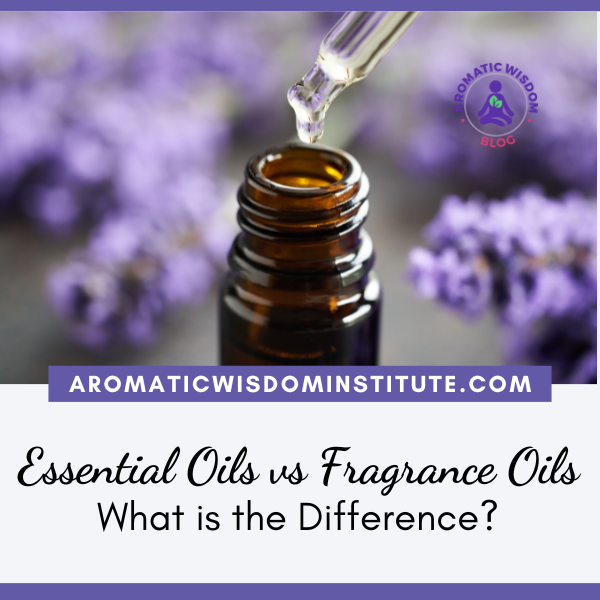🎧 Prefer to listen? AromaticWisdomPodcast.com/70
📖 If you’re more of a reader, dive into the blog post below! 👇
What is the Difference Between Essential Oils, Perfumes, and Fragrance Oils?
I think it’s fair to say that in some capacity, we are all affected by scent. Aroma, fragrance, scent, whatever you call it it is one of the key ways that we engage with the world, with the world around us in particular, and, therefore, it can have a powerful influence on our emotions.
When I was in my twenties, I lived in Philadelphia, PA and I worked at the Franklin Institute Science Museum. Yes. I did. I was the Director of Group Sales and absolutely loved that job.
At the time, I lived in South Philadelphia, what’s known as South Philly on 9th Street, about two blocks from the famous South Philly Italian Market. My apartment was on the 2nd floor, and it was directly across the street from an Italian bakery. This bakery, as all bakeries do, would start making their bread early in the morning, around 3:oo am. When I’d wake up at 7 am the aroma of freshly baked bread would waft into my windows. Even in the winter with my windows closed, I could smell the bread.
This was a powerful olfactory experience. I woke up feeling happy! Experiencing that comforting aroma, going to a job that I adored…it was a wonderful time in my young life. To this day when I smell freshly baked bread, I am transported to those Philadelphia mornings.
This capacity of scent to influence our moods and our emotions makes it fascinating; and misunderstood. The misunderstanding is particularly among people who are new to working with fragrances and scents like aromatherapists, perfumers, crafters and people who make soap and candles.
When we’re talking about the world of fragrance, there are two types of oils that take center stage:
Essential Oils and Fragrance Oils
Both offer beautiful aromas, but they are massively different in two key ways:
1. their composition
2. how they’re used.
I want to be clear that I’m not saying one is better than the other. My job as an educator is to impart information so that my student, or in this case, you, the listener, can make a more informed choice on what’s going to serve you and your purposes.
Let’s have a look now first at essential oils and then fragrance oils.
I’m going to break each of the oils down into four small segments.
- Definition
- Origin (how they are produced)
- Best Uses
- Safety .
- Essential Oils
Definition of an essential oil
An essential oil is an aromatic liquid that is formed within specialized glands and ducts inside a plant. The plants from which the essential oils can be found are varied, and, also the parts of the plants from which the oil is extracted is also varied. Let me give you an example. You can find essential oil glands in the leaves of some plants like eucalyptus, basil, tea tree.
You can find essential oil glands in flowers, lavender, rose, and jasmine. You can find essential oil in the roots of plants, like ginger, vetiver. You can find essential oils in the rind of citrus fruit.
You can also find it in some citrus leaves, but that’s a rabbit hole. Focus, Liz.
You can find essential oils in the rind of citrus fruit, like orange, grapefruit, lemon. And you can even find essential oils in tree resins. Frankincense and myrrh are 2 very common, good examples.
Origin of Essential Oils
Now let’s take a look at where essential oils come from and how they are produced.
There are a lot of different ways essential oils can be extracted from the plants in which they are formed. The two most common are distillation and cold pressing.
Distillation is when steam is used to extract the oils from the plant material because of the heat
Cold Pressing extraction involves mechanically pressing the oil out of the plant’s peel or rind. It’s actually a very cool device that kinda punches the skin, pierces the skin, and then squeezes it.
Both of these methods are designed to capture the aromatic components from the various plants.
The next thing we’ll examine, or the third part of essential oils that we’re looking at, is the best way to use essential oils.
So essential oils contain not only the plant’s natural, gorgeous aroma, which is often the first thing that attracts people to use essential oils is the spectacular fragrance, natural fragrance that is produced by these plants, but essential oils also contain powerful therapeutic properties.
These properties come about as a result of chemistry. I’ll give you an example. If you have a cup of coffee and you suddenly start to feel awake, you get a big dopamine hit that is from the caffeine molecule from the coffee bean. Now similarly, essential oils have their own special sets of chemistry of molecules that impart specific therapeutic activity from that essential oil. So a chemical such as d limonene, which you find in citrus plants, is great for boosting immunity. In the gorgeous lavender essential oil, there’s a component called Linil Acetate, which will help to sedate the central nervous system.
Let’s circle back to the topic of =aroma and fragrance.
Essential oils are beautifully aromatic. It’s the natural aroma that comes from the plant, and that makes them incredibly enjoyable, and you can certainly use the aroma to your advantage In many ways, you can fragrance a room with it at the same time while you’re creating an antibacterial effect in the room. You can make a blend that’s much more pleasant for the person using the blend. If you’ve designed it for them for healing, for some therapeutic purpose, and you add an essential oil you know that they love, they’re going to be much more likely to be compliant and use the blend. So, again, talking about fragrance, aroma, and the smell of an essential oil, is not why it works therapeutically. It is not because of the aroma that the healing takes place. It’s because of the chemical properties of that essential oil. You can have anosemia, which is a condition in which you lose your sense of smell, and essential oils will still work. They will still affect your healing.
If you have no sense of smell and you drink a cup of coffee, the caffeine molecule is still going to affect your central nervous system. So to wrap up this section on essential oils and their best uses, using therapeutically is true aromatherapy, and a lot of people will integrate aromatherapy into their professional wellness practice or at home, even in cleaning products. And, yes, they can be used in candles and soap, yet essential oils are very volatile, which means that they go from a liquid to a gas very quickly, and they will often escape. And so the aroma will not be very strong. It’s also an expensive way to make soaps and candles, and I will talk about cost in a minute. Essential oils are versatile. They can be used in a diffuser to scent the room. They can be used, as I mentioned, for topical wounds.
You can use essential oils in a nasal inhaler, massage oils, bath salts, even as natural cleaning agents, again, because of their chemistry, antiviral, antibacterial, and so forth.
Now we’ll move into essential oil safety, which is part four of essential oils.
So essential oils might smell like heaven, and, yes, they do. But you’ve got to remember safety when you’re using these potent natural extracts. Essential oils are very concentrated. Just because it’s natural doesn’t mean it’s safe. They should never be ingested, swallowed without proper guidance from a qualified health care professional. So this is my pat response that I always say to my students about ingesting essential oils.
It should always be the very, very last thing that you try for whatever you’re trying to address by swallowing them. In other words, if you’re trying to address a stomachache or some immunity issue, try first herbs or teas. How about drinking hydrosols? They’re safe and they can be very effective. Food! What a concept! How about eating food that will also boost your immunity or settle your stomach? There are many, many natural ingredients, natural products that you can ingest to boost your healing, whatever you’re trying to address that are not essential oils and that have been proven historically for decades and eons that we human beings have been ingesting and have proven to be effective. My belief is essential oils are most effectively and best used topically. I’m not gonna go too much deeper into safety, although I know it’s very important, but I have another podcast episode
I have a blog post, actually a lot of free content that I’ve created on the subject of safety. If you wanna go deeper, I’ll put those links in the show notes.
Let’s shift our focus now to Fragrance Oils!
Just as I did with essential oils, I will talk about 4 aspects of fragrance oils. The first being, of course, a definition. Then we’re gonna look at how fragrance oils are produced, you know, their origin. Then number 3, we’re going to look at the best ways to use fragrance oils.
And finally, safety indications for fragrance oils. Okay. Here is one definition. Fragrance oils are blended, synthetic aromatic compounds that are diluted with a carrier like propylene glycol, vegetable oil, or mineral oil. Sometimes they’re also called perfume oils or aromatic oils. So another thing to watch out for and be really careful is what the heck is the thing called. So in a nutshell, essential oils come from plants. Fragrance oils are created in a laboratory.
So what does this mean to the user? Well, at the risk of being corny, although in truth, I I kinda like being corny, I like to say it like this. With essential oils, you have the aroma and the therapy, aromatherapy. With fragrance oils, you have the aroma without the therapy. Again, one is not better than the other. 1 is not worse than the other. They’re simply different products for different purposes. Now that we’ve looked at the definition, let’s look at their origin. How are fragrance oils produced? This is the second part of our 4 parts for fragrance oil.
So scientists can do amazing things with scent from inside a laboratory. They can create a product called nature identical. Now why would they do this? Well, because it’s a very economical way to reproduce a scent that’s created in nature, but at a fraction of the cost. And not only that, but they can create fragrances that don’t exist in nature, such as hickory and suede fragrance oil. Something like raspberry hibiscus fragrance oil will neither raspberry nor hibiscus produce an essential oil. So by default, it’s going to be a synthetic fragrance oil. Speaking very broadly, fragrance oils are produced in 2 ways. 1, purely with synthetics, or number 2, with synthetics plus natural aromatic isolates.
So what the heck is an isolate, Liz? I’ll tell you. Looking at essential oil chemistry, we know that essential oils are made up of 100 of components for the most part. Some only have 3 or 4 components. But, regardless, every essential oil is made up of specific molecules that make up its being. There are things within the essential oil that give it its fragrance. Isolates in fragrance refers to a single odor molecule that has been isolated from the original essential oil. So they have a way of extracting the smelly molecule from, say, lavender, reproduce it, and add that to a fragrance oil. Sometimes they will take the extracted molecule and reproduce it synthetically, which is generally what happens.
Now recreating an aroma synthetically is not unethical. It’s just another way to get a fragrance. It is unethical when that is used to adulterate rose. For example, rose and sandalwood, these are very frequently adulterated with isolates, synthetic isolates, to get the smell because they’re very expensive oils. So that’s highly unethical. And another reason why I stress over and over again to my students and to you, my listeners, know your source. Every supplier should be completely transparent. They should be able to answer all your questions about the source of their products, the source of their ingredients, and it’s just really important to have a relationship with your supplier.
Okay. Hold on. Give me a minute while I step down from my soapbox. 🙂
So let me tell you a little story. In 1999 I spent a summer, week-long program called An International Training in essential oils at Purdue University in Indiana with Dr Jim Simon. One of the exercises we did was try to identify the isolate in the lavender by smelling 7 little samples of lavender – one of them was adulterated with synthetic linalool. The exercise was to smell these 7 samples of lavender essential oil and determine which one had been adulterated with synthetic linalool. At first I honestly I could not tell which was the fake one.
After we smelled these 7 samples of lavender, each of us were given a sample of synthetic linalol, just the isolate. It smelled like funky lavender. THEN, when I went back and smelled the 7 samples again, it was immediately easy to pick out the one that had the synthetic linalol in it. Once I had become familiar with the aroma of the synthetic, I immediately picked it up from the sample.
I’m telling you this because, initially, sometimes it can be really hard when you’re new working with essential oils to smell if something is real or if something’s been added to it. I promise you, the more you work with essential oils, the more you work with good essential oils, the easier it is to pick out something that’s off with an essential oil. It has a smell that it is synthetic. It smells like there’s something in it that doesn’t belong there.
So if you’re new to working with essential oils, trust me, with time and experience, you’ll get better and better at being able to identify really good essential oils.
LIZ RETURNING AFTER BEING SICK
So I want to say something at this point.
I have taken a break from this recording because as I was making the recording, I started to get sick. I got a really bad cold and a cough, and I could not record. In fact, I lost my voice for a little bit. So I’m back now to finish this recording. My apologies if I do sound a bit nasally or my voice has suddenly changed. It’s because I’m finishing the recording at a later date with the nose that is a little congested.
So I went back and just listened to the last thing I recorded, and we’re still talking about fragrance oils even though I did go off on a essential oil tangent there for a minute.
The big takeaway that I would like to impart upon you for this episode is that fragrance oils, unlike natural, fragrances like essential oils and and c o twos and absolutes. Synthetic fragrances are developed artificially in laboratories as opposed to being created from a natural source like botanicals.
Let’s talk about some good things with fragrance oils. Because fragrance oils are composed of artificial components, it allows for a lot of control over the aromatic characteristics. So, for example, if you want to create a candle or a batch of soap that has a very specific aroma, especially if it’s one that doesn’t even exist in nature, you want to be able to reproduce it. So one of the advantages of using fragrance oils is their consistency and their reproducibility. Try to say that 10 times real fast. Their ability to be reproduced exactly the same as the last batch.
Another upside of using fragrance oils is that they can create an extensive range of scents. There are companies like Yankee Candle – a very big American candle company and the first one that came to mind. I know there are others that have, I bet they have 100 of scents. They retire scents. They bring new scents every year. Certain ones become favorites, and they can just continue to create more and more scents.
So from a commercial standpoint, using fragrance oils allows for a lot of creativity and a bigger impact on the scents that they’re producing and that’s what their customers expect.
Okay. That was part three of fragrance oils.
Moving on to part four Fragrance Oil Safety. I’m a little out of my element here because I don’t work with fragrance oils, but what I do know is that people tend to have a lot more allergies or allergic responses to synthetic fragrances than to natural ones. It does make sense that our
bodies would respond more holistically to things that are natural and made in nature and would be much faster to repel something that is synthetic. So for any of you wondering, should I be concerned about using synthetic fragrances? First of all, if you’re listening to this podcast, you’re probably already committed to minimizing the number of synthetic ingredients in your life, whether it be in what you’re using on your body, in your healing products, in your cleaning products. You already know that synthetic fragrances can be problematic for your personal health and for our environment.
Specifically, I wan to talk about three things about synthetic fragrances that I want you to be aware. The first is that phthalates are often used as a fixative for the fragrance. Diethyl phthalate, DEP, is very commonly used as a fixative, which means it helps the smell last. We have natural fixatives that we use in aromatherapy, but DEP is a synthetic and probably very cheap. There has been some concern around DEP and its effects on the reproductive system. So, as always, know what the heck you’re buying and what you’re using.
The other thing is that manufacturers can create really inexpensive fragrance with petrochemicals, which are made from petroleum. There’s so many reasons why this is not a good idea, why it’s not something you wanna have in your life. One of the top things is it really increases skin irritation. So and and, again, there’s that whole environmental impact. So please reconsider buying any products made with synthetic fragrance. I wanna say specifically, cleaning products. They’re some of the biggest offenders of having nasties in their products. It is so easy to make your own natural cleaning products. I have got a couple of well, I’ve got a lot of blog posts. I think I’ve got 1 or 2, episodes of this podcast about cleaning products.
In the spring of this year, 2024, I am going to put out a small online course on Green Cleaning Naturally and all the different kinds of products you can make to clean your home. In that training, I have a pretty extensive list of the toxic stuff that they put in cleaning products.
Let’s see. Where was I? Petroleum. And then the final thing, which actually I’m gonna say now I’m starting to repeat myself, but allergic reactions are just really common when you’re using synthetic fragrances. Contact dermatitis, which just can create an itchy red rash. A lot of people can’t use specific laundry soaps because of the synthetic fragrances, and be very careful with using something like a deodorant, which is applied to the underarms, a really sensitive area of your skin – another place where synthetics will really raise their ugly heads.
Okay. I think that’s all I want to say about that.
Cost
Let’s talk about the cost differential between using essential oils and fragrance oils. Essential oils, of course are going to cost more than fragrance oils because of the difference in production methods and the raw materials. When you make an essential oil, it takes a lot of plant material to yield just a little bit of essential oil. And, of course, some plants will cost more than others to produce, some cost more to harvest. There’s a reason why lavender is inexpensive compared to jasmine.
The other thing is that consumers are willing to pay more for the natural benefits of essential oils compared to the aromatic qualities of fragrance oils.
Since fragrance oils are synthetically created, the materials, the production costs, and the end products are going to cost a lot less.
Okay. Wrapping up this conversation today about essential oils versus fragrance oils. We’ve explored the differences between the two, and, ultimately, your choice will depend on your intended use and sometimes your preference.
For Aromatherapy, Holistic Wellness, and Natural Therapy, if you want the therapeutic benefits of aromatics, you use essential oils. If all you want is scent, if you’re crafting scented candles, you’re making soaps, perfumes, or any product that relies on consistency and a wide diversity of scents, fragrance oils are probably what you’re gonna wanna go with. Sometimes it’s just not sensible to use essential oils for, fragrancing quite honestly for candles and so forth.
It’s extraordinarily expensive. Know that there are different qualities of fragrance oils and, you know, take a look at that when you’re exploring your options.




